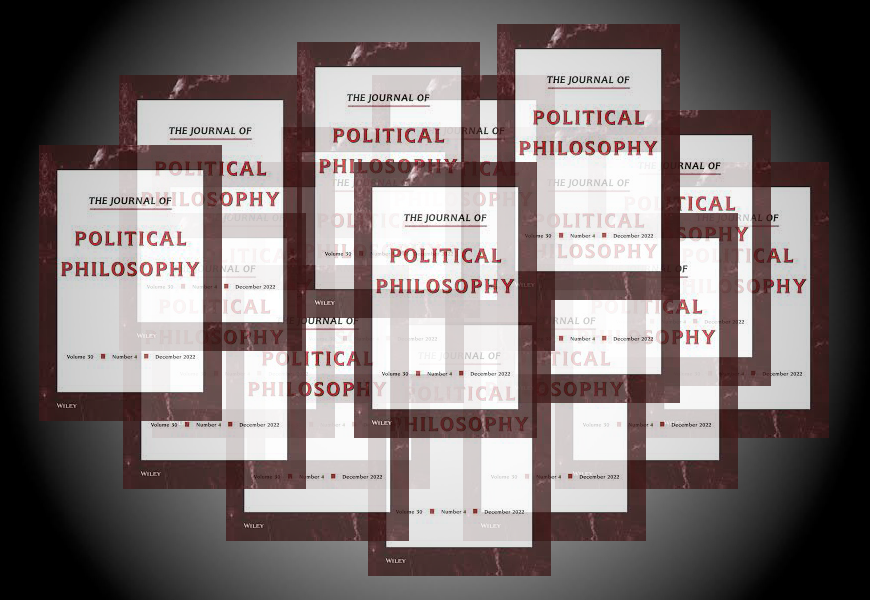Wiley’s APA Session on the Journal of Political Philosophy
“Anything they said about why this happened was at such a general level and in vague formulations, that those in the room didn’t really get any new factual information.”
That’s Ingrid Robeyns (Utrecht), writing about the session that Wiley put on at the Eastern Division Meeting of the American Philosophical Association (APA) yesterday morning about the Journal of Political Philosophy debacle (see here and here).

In a post at Crooked Timber, Professor Robeyns describes some of what occurred at the meeting. Here are some excerpts:
- “On the particular case of JPP and the firing of Bob Goodin, they didn’t really say anything, except that they “couldn’t continue working with the editor and fulfil their role as a publisher”. And when they described that role, there was lots of talk about the needs of ‘operational standardization’. Apparently, even within that small room, they could not provide details.”
- “Jonathan Quong, a member of the editorial board of JPP and now of the new journal Political Philosophy reminded Wiley that more than one thousand political philosophers had signed the petition in which they pledged not to submit, referee, or provide editorial services for the journal. So, he concluded, JPP doesn’t have a future. To which Wiley responded ‘thank you for that statement’—and that was it.”
- “Someone asked what would happen with the papers that are submitted now, given that there is no editorial team. They are received, and the authors get notified that the papers can currently not be processed. In essence, until there is a new editorial team, the papers are not being reviewed. I think under those conditions, it is unwise for anyone to submit a paper to JPP.”
- “Jonathan Quong noted that Wiley mentioned repeatedly during the meeting that they are not political philosophers and that they respect academic independence. ‘Yet how can they then appoint a new editorial team?,’ he asked. To this question, Wiley responded that they are in touch with the community, and that they are gathering advice on whom to ask for these editorial roles. No names were mentioned.”
In her post, Robeyns notes that there are legitimate concerns about publishing that are worth taking up, such as low journal acceptance rates (see here), whether journals should adopt triple-anonymous review (the new Political Philosophy will be sticking with double-anonymous review), and “that it’s really hard to publish on some topics in political philosophy in the journals that we have, such as nonwestern political philosophy.” But, she says, such concerns, and whatever criticisms there might have been about how the old Journal of Political Philosophy was run, “we must not let that be used as ammunition by Wiley to let them get away with what they did.”
Read her full post here.


“But, she says, such concerns, and whatever criticisms there might have been about how the old Journal of Political Philosophy was run, “we must not let that be used as ammunition by Wiley to let them get away with what they did.”
Political philosophers sent a clear message to Wiley that they won’t tolerate their autonomy being infringed upon by resigning en masse from running JPP.
But by setting up a new journal with all of the very same editorial and review policies as JPP, they also sent a clear message that they don’t take seriously concerns about triple-anonymous review and the like – they themselves have given Wiley “ammunition”.
Agreed on the need to send a strong message to publishing firms about our collective commitment to the autonomy of our institutions. But echoing E D, I’m worried this oversells the result. I don’t work in political philosophy, but taking account of the concerns raised at Daily Nous over the last few discussion threads on JPP, and which so far as I know haven’t been satisfactorily addressed, it does seem like JPP was not serving the academic community well in having so much regard in the discipline, while publishing so little. This dysfunction seems to be compounded by the additional fact (if it is a fact) that the review process at JPP appeared to centralize power in ways that don’t follow widely regarded “best practices” today. There was also a comment made in a discussion a few days ago that the new list of topics to be published at PP suggests hostility toward conservative views. I have no idea whether that’s the case, and the comment in question seemingly disappeared, but it is something perhaps worth being mindful of. Either way, good to have Wiley out of the mix, and hopefully it sets a precedent. But this also seems like a good time to think about just what sort of precedent is being set.
Happy to be corrected on any of this; again, I don’t work in the field and I’m going off of what I’ve heard from people who appear to be more in the know about things.
I would hazard to guess that these big companies have higher turnover and less institutional memory that we in academia, and that what you saw was a few new or middle management who had very little to do with the actual decisions or power over it being asked to show up and solve a problem they have no interest or ability to solve.
Do we know who was representing Wiley? I’m curious what their roles or job titles are, or what portfolios they manage?
Hannah Reed, an associate journals publishing manager who had JPP in her portofolio,
and
Rebecca Walter, director of social sciences and humanities.
Walter spoke most of the time; Read only read a statement at the start and then answered perhaps one or two more questions, but it was clearly Walter who was in the lead.